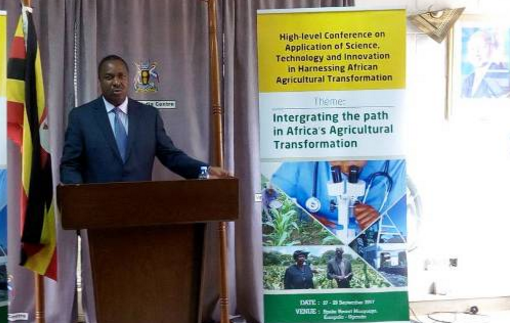Uganda will this week host a high- level conference on application of science technology and innovation in harnessing African agricultural transformation in Kampala, revealed Dr Elioda Tumwesigye, the Minister or Science, Technology and Innovation.
Speaking at Uganda Media Centre, Dr. Tumwesigye said currently, South Africa and South Sudan are the only countries in Africa that are using biotechnology in their agriculture sector but after the three-day conference staring Wednesday at Speke Resort Munyonyo will be held under the theme ‘Integrating the path in Africa’s agricultural transformation’ more African governments will realize how they need urgent intervention in innovation and technology in harnessing agriculture.
“This conference will showcase the current and potential impact of application of science, technology and innovation for improved agricultural productivity, value-addition and poverty reduction,” said Dr. Tumwesigye.
The targeted participants of the conference include leaders and decision makers, including President Yoweri Kaguta Museveni, Benjamin Mkapa former president of Tanzania, the Rt. Hon. Dr. Ruhakana Rugunda, Ms. Gina Grey Ivey from the Bill and Melinda Gates foundation, Dr. Hamadou Biteye the managing director Rockefeller foundation, Prof. Kevin Folta the University of Florida, Dr. C.D Mayee president Asian Biotechnology, Cyprian Ebong Executive director ASARECA, cabinet ministers, lead scientists/experts, farmer union leaders, industry captains, biotech advocacy/communication networks, senior science journalists/editors, Professors, UN representatives and development partners.
State of biotech crops in Uganda
The year 2014, marked the nineteenth year of the successful commercialisation of biotech crops. There has been a more than a hundred-fold increase in the area under these crops. Since 1996, this has expanded from 1.7 million hectares to 181.5 million hectares. This represents a 6.3 million hectare increase compared to five million hectares in 2013 at an annual growth rate of three to four per cent.
This increase makes “biotech crops the fastest adopted crop technology in recent times, because they deliver benefits”, according to a report on the global status of commercialised biotech. It was published by International Service for Acquisition of Agri-biotechnology Applications (Isaaa).
And the pressure to pass the Biotechnology and Biosafety Bill 2012 has started building up in recent months after some parts of the country experienced food shortages due to the prolonged drought. Uganda had planned to commercialise GM cassava by 2016 which would help fight the mosaic virus as well as protect maize against stem borers and produce drought-tolerant varieties by 2017. But the absence of a biotech law stands in the way of these plans.
Foreign organisations that Uganda is working with in developing genetically engineered crops include the Bill and Melinda Gates Foundation, the Rockefeller Foundation, United States Agency for International Development (USAid), and universities such as Arizona State University and Cornell University in the US, University of Leeds in the UK, and Queensland University in Australia.
Uganda has also carried out field trials on bananas to test resistance to the black sigatoka disease (2007-2009). The country is carrying out two trials on banana bio-fortified with vitamin A and iron, and testing resistance to the devastating banana bacterial wilt.
Dr. Tumwesigye told TheUgandan that using biotech in Uganda has tremendously grown and the yields are impressive. “Small scale farmers are already using biotechnology and it is working well. Government provides free seeds and seedlings to farmers who are interested.”
“But don’t forget we are also promoting our indigenous crops, the biotechnology crops will be a supplement, for example; Uganda ties with China in second position after India as the biggest producers of matooke in the world,” he added.










